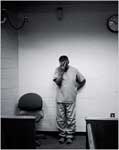With his hand-rolled cigarettes, typical stubble and a Leica slung around his neck, Mr. Keating could give off a roguish air. Some colleagues considered him “a talented if mercurial lensman who sometimes behaved like a hotdogger,” the journalist Lloyd Grove wrote in The Washington Post in 2003. Mr. Keating acknowledged to The Post that he had twice been suspended by The Times for infractions unrelated to his work. His photography led to a final dust-up with the paper.
Tag: Edward Keating
-
Edward Keating, Times Photographer at Ground Zero, Dies at 65 – The New York Times
-

Blue Highway: Photographs by Edward Keating
LightBox | Time
Read the latest stories about LightBox on Time
via Time: http://lightbox.time.com/2011/09/06/blue-highway-photographs-by-edward-keating/#1
For a New York kid who grew up on the blues, blowing a mean mouth-harp from age 14, this was a trip home—the home of the spirit. Keating wound up Clarksdale, Miss., which is as close to the birthplace as you can get. And there, something almost mystical happened.
-

A New Reason to Celebrate: New York City’s Gay Pride 2011
LightBox | Time
Read the latest stories about LightBox on Time
via Time: http://lightbox.time.com/2011/06/27/a-new-reason-to-celebrate-new-york-citys-gay-pride-2011/#1
New York City based photographer Edward Keating photographed the weekend events for TIME. Documenting both the colorful (and flamboyant) parade and the partying afterward, Keating spent hours in the excited crowds and in packed bars and restaurants in the West Village.
-

Edward Keating in Joplin, Missouri
LightBox | Time
Read the latest stories about LightBox on Time
via Time: http://lightbox.time.com/2011/05/27/a-town-lost-in-the-wreckage-by-edward-keating/#1
The wreckage left by the Force 5 tornado in Joplin, Mo., defies description and baffles belief. That’s where Edward Keating comes in. The veteran photojournalist blends a tender love for Joplin—he knows the city from repeated visits as part of a project he is pursuing on the storied American artery Route 66—with a clear, unflinching eye.
-

The Long Interrogation
With a photo by Edward Keating (is he back with NYT?), from the New York Times Magazine:
Late one afternoon in February 1978, according to sworn testimony, a squad of revolutionary guards arrived at the home of Edgegayehu Taye, a 22-year-old civil servant. They told her she was wanted for questioning. She went without protest. The guards pushed her into the back seat of a Volkswagen and drove her some distance, until the car reached a corrugated metal gate marked by a sign that read: “Higher Zone 9.” The guards took her into the main office. Edgegayehu was ordered to strip naked and was bound with rope at her wrists and knees. Then the guards ran a pole through the loops in the rope and hung her between two desks, like a pig on a spit. They lashed her with plastic cables.
Over and over again, the man behind the desk, the one with the afro, asked her, “Are you a member of the E.P.R.P.?”
Years later, when she saw the man standing by the elevator at the Colony Square Hotel, Edgegayehu wasn’t sure it was Kelbessa at first. He’d gotten older, gained some weight, lost his swagger. He certainly didn’t seem to recognize her. Then Kelbessa smiled widely and greeted her, and she knew for sure. “The voice,” she told me. “You don’t forget the voice.”
Here.

